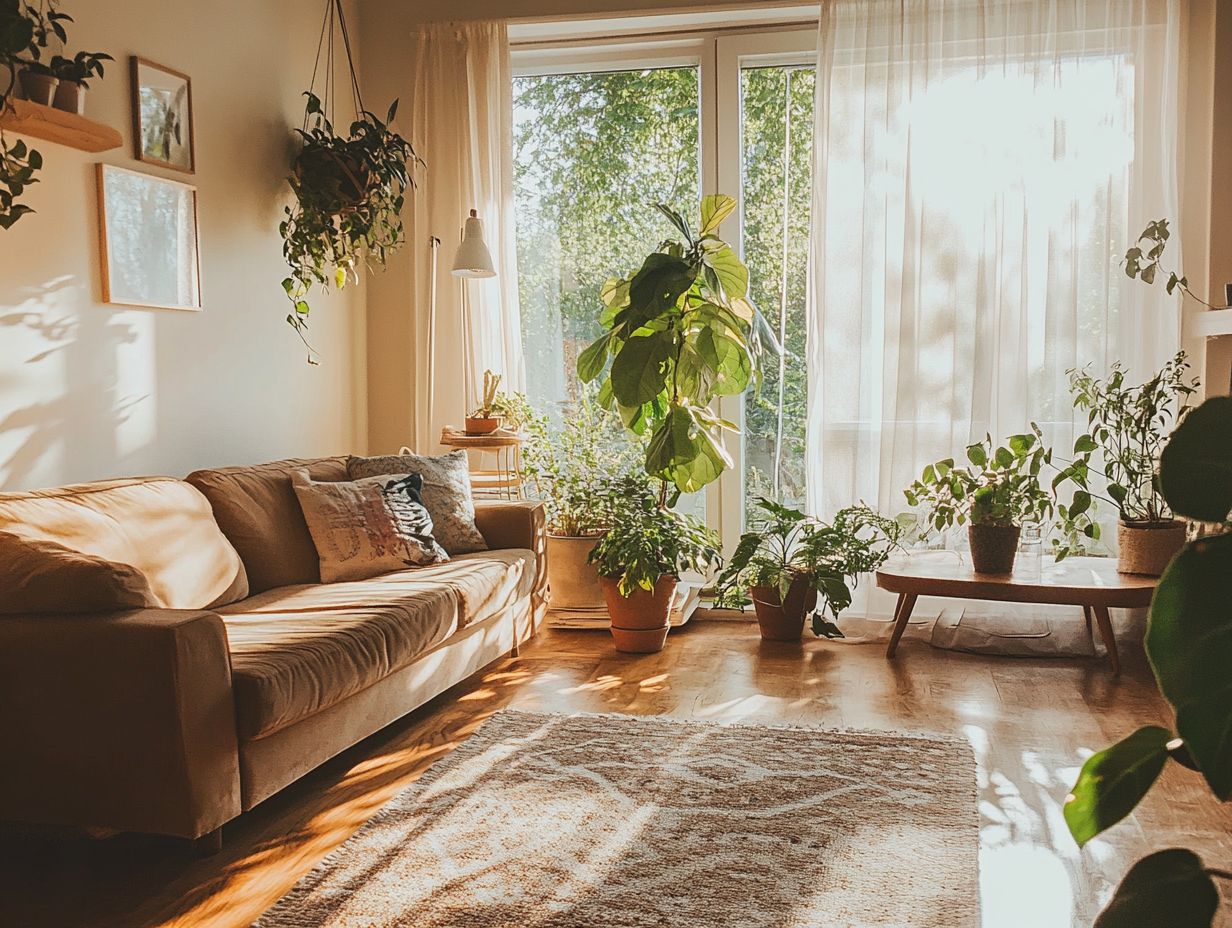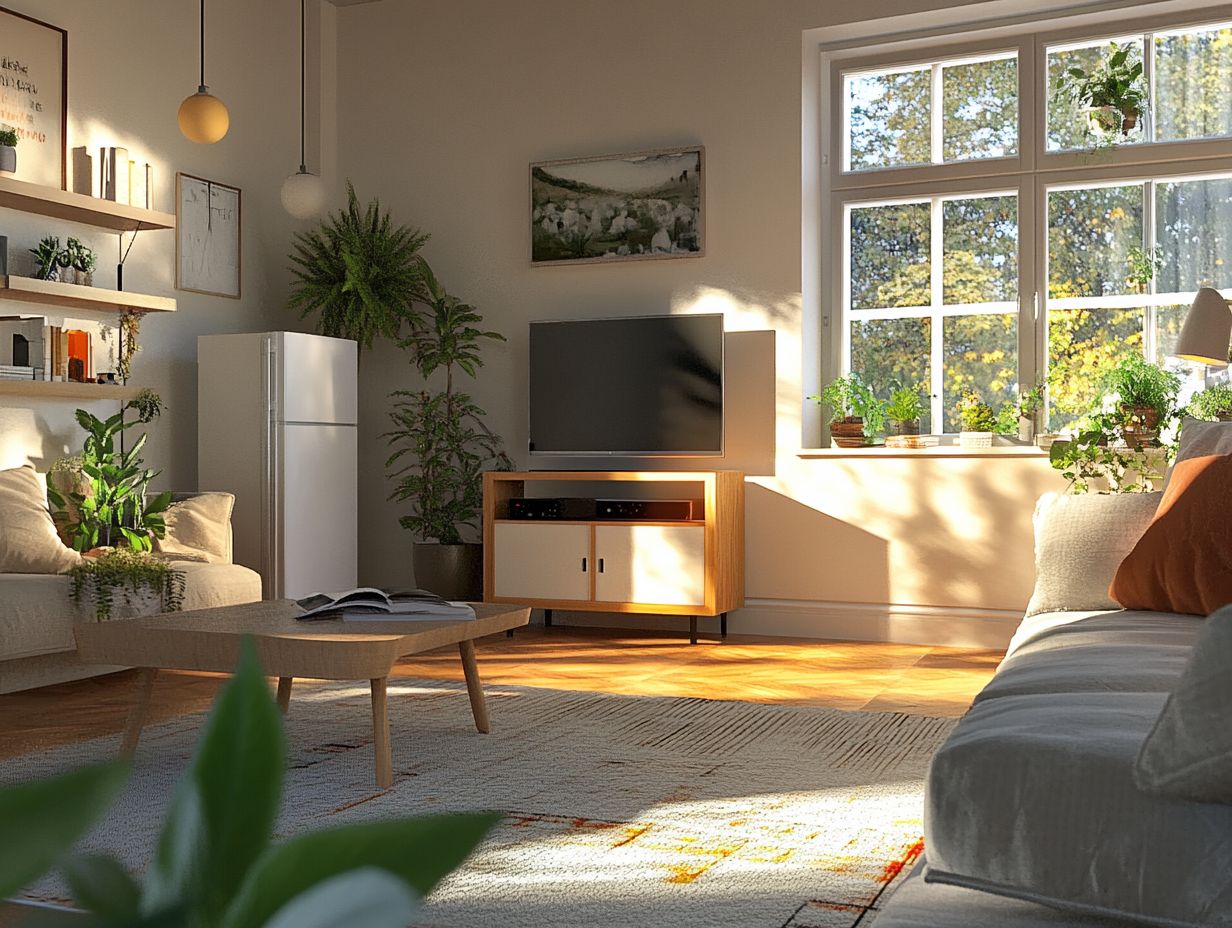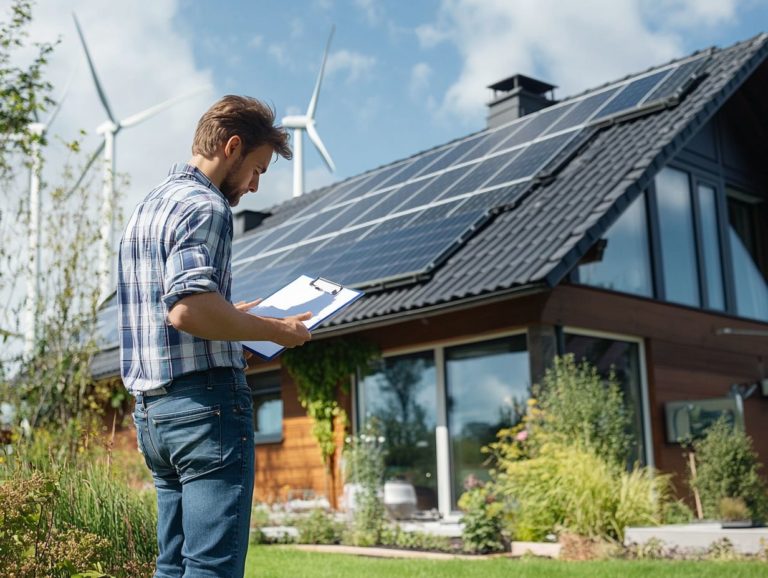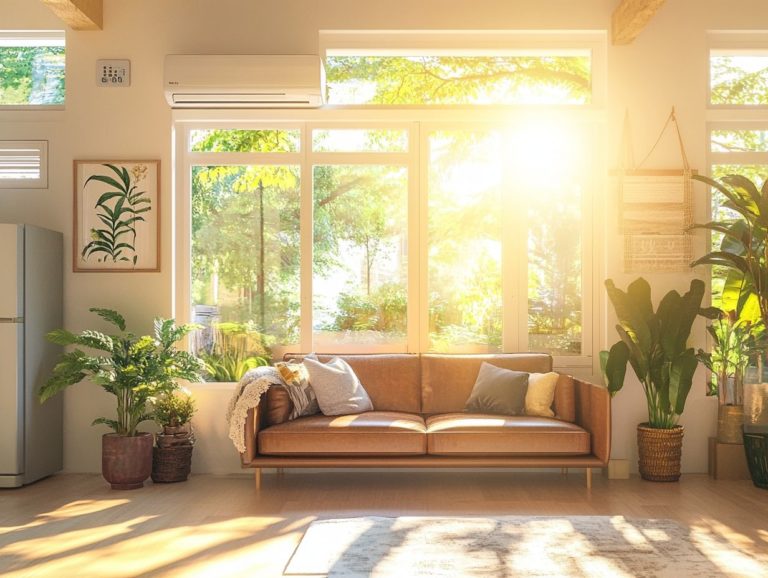How Can I Make My Home More Energy Efficient?
In today s world, energy efficiency is more vital than ever not just for your budget, but also for the health of our planet.
As energy costs continue to rise and awareness of climate change grows, you may find yourself seeking ways to reduce consumption and embrace a more intelligent lifestyle.
This guide will empower you to understand your energy usage, pinpoint areas for improvement, and implement straightforward changes that will elevate your efficiency.
Discover cost-effective upgrades, renewable energy options, and sustainable habits that can transform your home into an eco-friendly haven.
Dive in and explore how you can make a meaningful impact while reaping long-term savings.
Contents
- Key Takeaways:
- The Importance of Energy Efficiency in the Home
- Identifying Areas for Improvement
- Simple Changes to Increase Energy Efficiency
- Investing in Energy-Efficient Upgrades
- The Role of Renewable Energy
- Creating Sustainable Habits for Energy Efficiency
- Frequently Asked Questions
- What are some simple ways to make my home more energy efficient?
- How can insulation help improve the energy efficiency of my home?
- Are there any government programs or incentives available to help make my home more energy efficient?
- What is the best way to lower my energy bills?
- Can landscaping help improve the energy efficiency of my home?
- Does the age of my home affect its energy efficiency?
Key Takeaways:
- Understand the impact of energy consumption on the environment and your wallet.
- Identify areas in your home where energy inefficiencies can be improved.
- Simple changes and investments in energy-efficient upgrades can lead to long-term cost savings and a greener home.
The Importance of Energy Efficiency in the Home
Energy efficiency in your home is essential not just for slashing those energy bills, but also for elevating your comfort and embracing sustainable living.
By adopting energy-saving tips and investing in energy-efficient appliances, you can dramatically reduce your carbon footprint.
Engaging in home improvement projects like upgrading insulation and conducting an energy check-up can foster long-term savings and promote a more eco-friendly lifestyle. Your commitment to energy efficiency not only saves you money but also plays a vital role in the broader movement against climate change.
Understanding Energy Consumption and Its Impact
Understanding energy consumption in your home is crucial for managing your energy bills and pinpointing areas ripe for improvement through an energy check-up.
By recognizing the factors contributing to your energy use like the age and efficiency of your appliances, the quality of your insulation, and your daily habits, you can take informed steps to lower costs. Common household items such as refrigerators, water heaters, and older heating and cooling systems often consume significant amounts of energy. Upgrading to energy-efficient home improvements not only reduces your consumption but can also lead to substantial savings over time.
Incorporating simple strategies, such as using programmable thermostats, sealing windows, or switching to LED lighting, can further enhance your efficiency while keeping your energy expenditures in check. For more tips, check out 5 ways to improve your home’s efficiency today.
Identifying Areas for Improvement
Identifying areas for improvement in your home is a crucial step toward elevating energy efficiency. Consider conducting an energy check-up; this process helps you find issues like drafts and poor insulation, allowing you to make informed decisions that enhance comfort and reduce energy costs.
Assessing Energy Usage and Inefficiencies
Assessing energy usage and inefficiencies in your home requires a close examination of your heating, ventilation, and air conditioning (HVAC) system’s performance and consideration of upgrades, such as a tankless water heater or duct sealing.
To effectively gauge your energy consumption, start with a comprehensive evaluation of your heating and cooling systems. Pay particular attention to common issues like leaks in ductwork or outdated equipment that may no longer meet efficiency standards. Additionally, consider exploring how to make your home more energy efficient for further improvements.
Checking the quality of your insulation can uncover hidden energy losses. Incorporating smart thermostats provides a contemporary approach to better temperature management. By addressing these key areas, you can optimize your existing systems and explore options like programmable thermostats or energy-efficient appliances.
These choices can lead to substantial long-term savings and a significantly reduced carbon footprint.
Start your journey toward a more energy-efficient home today!
Simple Changes to Increase Energy Efficiency

By making a few straightforward adjustments in your home, you can greatly enhance energy efficiency and reduce your energy bills.
Consider replacing incandescent bulbs with LED light bulbs, which consume less power and last longer. Installing low-flow showerheads also helps conserve water.
These small changes can lead to substantial savings and a more sustainable living environment.
Tips for Reducing Energy Consumption
Implementing energy-saving tips can significantly lower your consumption. Use a smart thermostat and maximize natural shade to keep your home cool.
Maintaining a comfortable temperature year-round is essential. Excessive heating or cooling can lead to inflated bills.
A smart thermostat can automatically adjust the temperature based on your schedule. This ensures energy isn t wasted when you re not home.
Incorporating energy-efficient fireplace inserts can provide warmth during colder months while minimizing heat loss.
Regular maintenance of these systems is crucial for maintaining efficiency. Adopt these practical measures today to create a cozy environment!
Investing in Energy-Efficient Upgrades
Investing in energy-efficient upgrades not only elevates your home comfort but also paves the way for substantial long-term savings on your energy bills.
Consider options like Energy Star-certified appliances and the installation of solar panels; these choices are invaluable investments that pay dividends over time.
Cost-effective Options for Long-term Savings
Explore cost-effective options like installing solar panels or opting for a tankless water heater. These can lead to significant long-term savings.
Energy-efficient appliances, such as ENERGY STAR-rated refrigerators and washing machines, can use up to 50% less energy than their less efficient counterparts.
While the initial investment may seem steep, those savings in utility costs will quickly add up. Upgrading to programmable thermostats gives you greater control over your heating and cooling systems.
This not only contributes to decreased energy consumption but also helps lower your monthly expenses. Switching to LED lighting throughout your home can also result in substantial savings.
These fixtures consume less power and last significantly longer than traditional bulbs. Make these intelligent upgrades to create a more sustainable living environment while enhancing your overall comfort.
The Role of Renewable Energy
The role of renewable energy, especially through the installation of solar panels, is becoming increasingly vital in elevating energy efficiency and diminishing dependence on fossil fuels.
Embracing this shift not only contributes to a sustainable future but also gives you the power to make a meaningful impact on the environment.
Exploring Alternative Energy Sources

Exploring alternative energy sources like solar panels enhances your energy efficiency and plays a vital role in creating a cleaner environment.
Innovative solutions such as wind turbines and geothermal heating systems utilize natural forces, significantly reducing reliance on fossil fuels.
By installing solar panels on your rooftop, for instance, you can generate your own electricity and lower your utility bills. This promotes sustainability all at once.
Utilizing wind energy through small turbines can enhance your energy independence. This allows you to capture the impressive power of the wind.
Incorporating geothermal heating systems uses the Earth s stable underground heat to keep you cozy during colder months. Together, these renewable energy options cultivate a more eco-friendly living space and strengthen your individual economic resilience.
Start making these changes today for a brighter, more sustainable tomorrow!
Creating Sustainable Habits for Energy Efficiency
Want to save money and the planet? Creating sustainable habits for energy efficiency is your answer! Embrace straightforward yet impactful energy-saving strategies.
By integrating tools such as programmable timers, you can optimize your energy usage with ease, ensuring that your efforts yield lasting benefits.
Practical Tips for Maintaining Energy Efficiency
Maintaining energy efficiency in your home demands consistent effort. Incorporate practical tips like using a smart thermostat and blocking air leaks to simplify your journey.
By taking a proactive approach, you can leverage various strategies to optimize your energy usage. Regular energy audits help make this easier, allowing you to identify specific areas that need improvement.
These assessments not only reveal inefficiencies such as drafty windows or outdated appliances but also provide actionable recommendations tailored to the unique needs of your home, including tips on how to reduce your carbon footprint at home.
Beyond these periodic checks, embracing energy-efficient practices like switching to LED lighting and ensuring proper insulation can significantly enhance your overall energy-saving efforts. To learn more about optimizing your workspace, check out this guide on how to create an energy-efficient home office. Even small changes can lead to substantial impacts, resulting in lower utility bills and a reduced carbon footprint.
Frequently Asked Questions
What are some simple ways to make my home more energy efficient?
Some simple ways to make your home more energy efficient include sealing air leaks, using energy-efficient appliances, and switching to LED light bulbs. Consider using low-flow fixtures to save water and energy.
How can insulation help improve the energy efficiency of my home?

Insulation helps regulate the temperature in your home, keeping it cooler in the summer and warmer in the winter. This can reduce the amount of energy needed to heat or cool your home, especially when combined with heating and cooling system upgrades.
Are there any government programs or incentives available to help make my home more energy efficient?
Yes! There are various government programs and incentives, such as tax credits and rebates, available for homeowners looking to make their homes more energy efficient. This includes offerings by Duke Energy for solar panel installation and energy audit programs. Check with your local government or utility company for more information.
What is the best way to lower my energy bills?
One of the best ways to lower your energy bills is to take steps to make your home more energy efficient. This can include using energy-efficient appliances, turning off lights and electronics when not in use, and properly sealing and insulating your home using duct sealing techniques.
Can landscaping help improve the energy efficiency of my home?
Yes! Strategically planting trees and shrubs around your home can provide natural shade in the summer, reducing the need for air conditioning, and also act as a windbreak in the winter, keeping your home warmer.
Does the age of my home affect its energy efficiency?
Generally, older homes tend to be less energy efficient than newer homes, as they may have outdated insulation and appliances. However, there are still ways to improve the energy efficiency of older homes with upgrades such as window upgrades and attic insulation.
Ready to start saving? Implement these strategies today for a more energy-efficient home!






